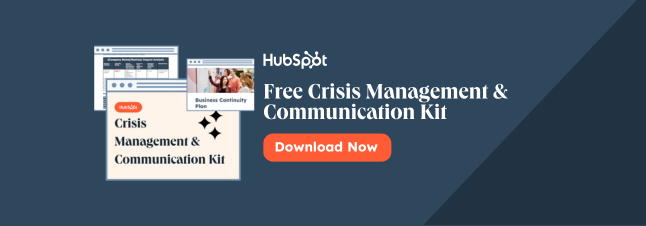Whatever the situation may be, like a natural disaster or the loss of a critical business supplier, various crises can affect your business.

While it may seem daunting to experience them and confusing to plan for them when you don’t know what will happen, it’s essential to be prepared for anything and everything, especially within your service teams. They’re there for your customers, and you never want them to abandon them during a crisis.
Here we’ll discuss why it’s essential to prepare your call center agents for a crisis and how to prepare for one so that you can respond effectively, minimize downtime, and continue to satisfy your customers.
Why is it important for call center agents to be prepared for a crisis?
As a refresher, a call center is a team within a service department that manages incoming and outgoing customer calls. Representatives communicate directly with customers and work to provide resolutions.
As such, the most critical reason why call center agents need to be prepared for a crisis is that you want them to continue providing resolutions and satisfying experiences to customers, rain or shine.
In addition, being prepared for a crisis shows empathy to your customers, which is a pillar of providing excellent service. Agents are there for them for what they need, even if they are temporarily working harder to do so.
Call center agents being prepared also helps you maintain your brand’s public image. Customers will talk about their negative experiences, so continuing to be there for them lowers the chances of this occurring. Instead of floundering, you rise to the occasion, and your customers notice that.
Lastly, you never want any part of your business to come to a halt, especially one as crucial as your service teams. Having agents trained in crisis communication ensures that call centers don’t come to a standstill during a time where you’re guaranteed to be dealing with increased contact with customers.
Given its importance, let’s go over how to prepare your call center agents for a crisis.
How To Prepare Your Call Center for a Crisis
Develop a Crisis Communication Plan
A crisis communication plan is a set of guidelines that you develop to help you prepare for an emergency or unexpected event.
As a call center makes up a specific side of your business, this plan won’t need to be as all-encompassing as a business-wide emergency plan. In this document, the most important thing you’ll want to do is identify key personnel that can take charge during these times.
These people should be comfortable and prepared to step up during a crisis and fully understand what is expected of them. They should communicate with agents about what will change and be responsible for adapting messaging, responses, and call scripts (which we’ll discuss below) to each specific crisis you may face.
The image below is an example of what a response team action plan could look like.
You’ll also want to draft procedures for the steps that will happen when a crisis does occur. Here are some examples of questions you’ll want to address in your plan:
- How soon after a crisis occurs will the priority team assemble and begin to draft messaging?
- How long should it take to adapt call scripts to the unique situation at hand?
- How long should it take to communicate with agents and explain what is going on so they can effectively communicate with customers?
Draft call scripts and communication messaging.
A call script can do numbers in terms of minimizing downtime between pivoting to crisis communication. It can also help your agents feel prepared if they feel stressed about how to continue to satisfy customers during a challenging period.
While it’s not possible to pre-make call scripts for every situation you may face, consider creating a general document that contains language that should be used when speaking with customers that can be adapted to each unique situation.
For example, you can expect that standard question customers may have is how the crisis you’re facing will affect them. You can plan for this question on a script and have a baseline response like this:
“I understand that you’re feeling worried about how [crisis] will affect you. Thankfully, our teams are prepared and working on coming to a solution. Some possible interruptions or issues you may encounter are [fill in information relevant to the specific crisis].”
When you have a specific script written out, the responsible individuals you’ve named in your communication plan will only have to fill in the unique crisis information before passing it off to your agents.
Prioritize emotional intelligence.
Emotional intelligence is the ability to manage your own emotions and identify and manage the feelings of others. During a crisis, emotional intelligence is key to success.
Despite any anxiety that agents may be feeling, they’re able to manage their own emotions and continue to support customers, and uphold the excellent service reputation you already have. Agents should lead with compassion and empathy, recognize that callers are more nervous, and respectfully and carefully validate their emotions while doing everything they can to support them through the situation.
Advocacy language is an excellent tool for practicing emotional intelligence, as it involves using language that prioritizes customer satisfaction and issue resolution.
Consider the following scenario: A customer calls in during a crisis. You’re nervous, and you know they’re worried too, but your nerves get the best of you, and you say something like, “Yeah, this is a stressful situation for everyone.” You’re not managing your own emotions but instead letting them affect and contribute to your customer stress, which is the opposite of what you want.
Instead, say something like, “I recognize that the situation at hand may be causing you a bit of stress, and I’m going to do everything I can to ensure your problem is resolved.” You’re using your knowledge of how stressful the situation is but not letting your stress drive the car, and you’re validating the customers’ emotions and letting them know that you’re there for them.
Run test drills.
Having a plan for your call center agents to implement is great, but it’s equally important to test what you have. This will help you identify any areas of your plan that need improvement and any possible additions that are crucial to success.
A great way to run test drills is to have your agents conduct mock calls with their coworkers. This allows them to test out their methods of communication, obtain feedback from their peers, and adapt their strategies, so they’re sure to satisfy customer needs during real conversations.
In addition, if you have a sample call script, you may give the responsible individuals a sample scenario and have them adapt the script to fit the situation to get a sense of how long it takes to draft communication to be used during calls.
All in all, preparing your call center for a crisis centers around helping your agents deal with heightened customer emotions. If you make a point to prioritize emotional intelligence with your teams and create scripts for them to follow during crises, your agents will be expertly managing customer emotions and continuing to provide delightful service experiences no matter the situation.


![De-Escalation Techniques: 30 Proven Strategies to Diffuse Tension and Build Trust [Expert Tips + Data]](https://www.hubspot.com/hubfs/de-escalation-techniques_2.webp)





![Social Media Crisis Management: Your Complete Guide [Free Template]](https://www.hubspot.com/hubfs/social-media-crisis-management-1-20241107-3106355.webp)

